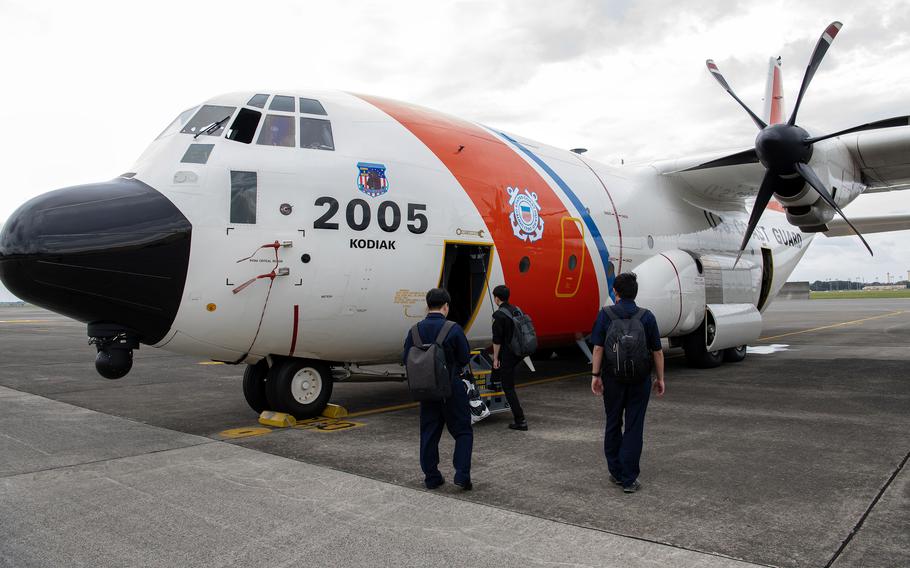
Members from the Japanese Fisheries Agency and Korea coast guard board a U.S. Coast Guard HC-130J Super Hercules at Yokota Air Base, Japan, Sept. 22, 2023. (Yasuo Osakabe/U.S. Air Force)
The United States, Australia, India and Japan are planning joint coast guard and maritime police patrols amid growing Chinese activity in the region, according to unnamed diplomatic sources cited Monday by Japan’s Kyodo News.
The plan aims to stem illegal fishing and may be included in a joint statement issued at a summit of the four nations, known as the Quad, for the Quadrilateral Security Dialogue, on Saturday in Delaware, the agency reported.
It comes as clashes grow in number between Manila and Beijing over territorial claims in the South China Sea.
The Philippine navy reported 203 Chinese ships in disputed waters between Aug. 27 and Sept. 2.
Public affairs officials at Yokota Air Base in western Tokyo, which hosts U.S. Coast Guard Activities Far East, referred questions to U.S. Forces Japan on Monday. USFJ did not immediately respond that day to an email query.
U.S. Indo-Pacific Command chief Adm. Samuel Paparo spoke Sept. 9 via video conference with Gen. Wu Yanan, commander of China’s Southern Theater Command, which oversees the South China Sea.
Discussions between senior leaders reduce the risk of misperception or miscalculation, Paparo said, according to a readout of the call from the command.
He cited recent “unsafe interactions” between China and U.S. allies and reinforced Beijing’s obligation to comply with international laws and norms to ensure operational safety.
Paparo urged China to reconsider its use of “dangerous, coercive, and potentially escalatory tactics in the South China Sea and beyond.”
On Thursday, Lieutenant General He Lei, a former vice president of the Chinese army’s Academy of Military Sciences, sharply critiqued U.S. plans.
“If the United States insists on being a plotter that pushes others to stand on the front line to confront China, or if it has no other choice but to challenge us by itself, the Chinese people and the [army] will never waver,” he told reporters at a security forum in Beijing, according to a New York Times report Sunday.
China’s coast guard, authorized to use force in territorial waters since 2021, includes over 150 regional and oceangoing patrol vessels, according to an October report on China’s military by the Defense Department.
“The newer, larger [Chinese coast guard] vessels are equipped with helicopter facilities, high-capacity water cannons, multiple interceptor boats and guns,” the report states.
Joint coast guard patrols by the Quad nations in waters claimed by China could cause friction, said Ian Chong, an associate professor of political science at the National University of Singapore.
“Such a situation could demonstrate the international nature of some of those waters,” he told Stars and Stripes in an email Monday.
If Quad law enforcement vessels intercept Chinese boats involved in illegal fishing, “could that result in retaliation by [China]?” he wrote.
If the four nations pool efforts, especially surveillance and intelligence resources, and target and locate “high value” targets, such as fishing boats that have turned off electronic identification beacons, and inflict real punishment, that would be helpful, said retired Marine Col. Grant Newsham, a senior researcher with the Japan Forum for Strategic Studies in Tokyo.
“They might also target particular areas where the illegal fishing is most pronounced — and help out certain countries that have particular problems,” he said by email Monday.
New Zealand-based security expert Paul Buchanan said he doesn’t expect the Quad patrols to have a major impact on illegal fishing, especially if China’s military starts escorting fishing boats.
The move signals intent, he said by email Monday, “perhaps with the idea of curtaining illegal Chinese fishing in the first place, particularly in the Indian Ocean and blue water Western Pacific.”